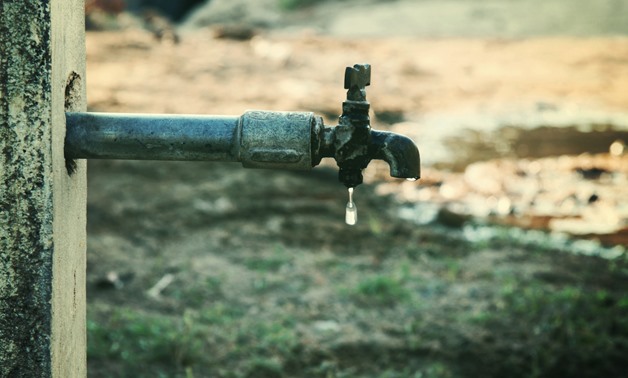
Water tap- CC via Flickr/ Vinoth Chandar
CAIRO – 25 February 2018: Egypt is preparing a LE 900 billion national plan for water management over the next 20 years in participation with nine ministers to develop solutions for water scarcity, stated Minister of Irrigation and Water Resources Mohamed Abdel Atti on Sunday.
During the “Egypt Can…With the Sons of the Nile” conference held on Sunday in Luxor and attended by 23 Egyptian international scientists, Abdel Atti remarked that the country allocates LE 70 billion out of LE 900 billion in investments for the crisis of water shortage.
Egypt suffers from a water deficit of 30 billion cubic meters; it annually needs at least 90 billion cubic meters of water to cover 90 million citizens’ needs. However, it currently has only 60 billion cubic meters, of which 55.5 billion cubic meters come from the Nile and half a billion cubic meters come from non-renewable subterranean water in the deserts.
Egyptian population growth is projected to increase by 2050 to 65-75 percent, causing a challenge. Hence, Abdel Atti added that the Ministry of Irrigation is adopting water security strategy by desalinating water, managing waste water and rationalizing water usage.
However, he stressed that further challenges are facing Egypt in tackling solutions for water crisis as 97 percent of water resources are transboundary as well as climate change, rising sea levels and misuse of water consumption affecting the situation.
He further explained that Egypt should nationalize desalination manufacturing, look for low cost technology to solve water problems and establish dams for rainwater harvesting.
He added that the Ministry of Irrigation is developing water resource information through a remote sensing technology that pinpoints areas that consume large amounts of water.
“We are about to establish a regional center unit to follow water movement and combat this problem,” said Abdel Atti, adding that the Ministry runs 48 irrigation facilities and 583 lift stations to provide Egypt’s regions with water.
Minister of Military Production Mohammed el-Assar remarked that Egypt seeks contact Egyptian scientists abroad through this conference to benefit from their expertise regarding Egypt’s water projects and all military production companies.
Managing director of the UNESCO chair on Hydrological and Water Resources Management at Germany’s RWTH Aachen University Hani Sewilam underlined the importance of using technology to guarantee a rational consumption of water and recycling of drainage water.
Sewilam, said that Egypt is facing water shortage, but it would be able to address it, calling for decreasing the cultivation of water-saturated crops and increasing the government’s budget for water research centers.
“Egypt Can 3” conference comes amid a water scarcity problem faced by Egypt due to the uneven water distribution, misuse of water resources, inefficient irrigation techniques and growing population.
The two-day-conference tackles many water issues including the mechanisms used to benefit most from available water resources, water desalination, and the challenges of climate change, sustainable management for irrigation, investments in different water fields, ways to use renewable energy in irrigations and the spread of awareness about water.
Further decrease in Egypt's water resources is expected in the future due to the above mentioned challenges, particularly amid the construction of the Grand Ethiopian Renaissance Dam (GERD), which could have negative impact on Egypt’s Nile water share.
Despite the latest negotiations between Ethiopia, Egypt and Sudan to resolve the technical issues of the dam, Egypt is keen to look for new sources of water and to rationalize its usage to overcome any water scarcity problems in the future.
Wastewater management is one of negotiable mitigation means to ease the crisis. However, Egypt is among 11 Arab countries that have adopted legislation permitting the use of treated waste water for agriculture, according to United Nations’ 2017 report entitled “Wastewater…The Untapped Resource”.
During a press conference held on December 13, 2017, by the Ministry of agriculture, the UN Food and Agricultural Organization (FAO), the European Bank for Reconstruction and Development and the World Bank, the Minister of Irrigation Abdel Ati highlighted several solutions to deal with water scarcity.
The first is the treatment of ground water to be reuse 25 percent of used water in agriculture and produced. Second solution is improving the irrigation system by implementing modern irrigation techniques.
“The third pillar is developing water resources through the desalinization of water from the Red Sea and the Mediterranean. This needs a lot of energy, however, and this is why we are diversifying sources of energy like nuclear, solar, wind and hydro-power. We are also building water-collection facilities in Sinai, each of which can store up to 500 cubic meters of rain water.”
Egypt has already started using desalinized sea water with the mega-facility, Al-Yusr Plant in Hurghada, which was inaugurated in January 2018 to provide the Red Sea governorate with fresh water instead of current pipelines from the Nile.

Comments
Leave a Comment